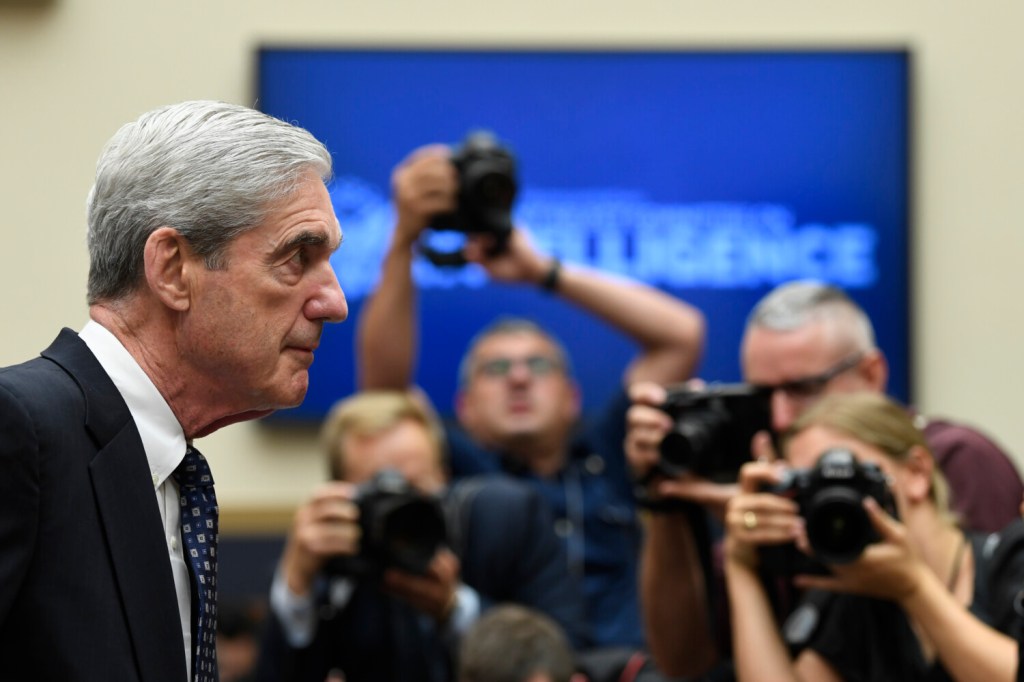Throughout his testimony in the U.S. House of Representatives on Wednesday, and despite multiple efforts to divert him, former special counsel Robert Mueller was focused on just the two issues that were the topics of his official report: Russia’s interference with the 2016 presidential campaign and possible obstruction of justice by President Donald Trump.
Both Republicans and Democrats disliked it, and found it weak, when Mueller answered their lengthy questions by referring to that report. “I rely on the language of the report,” he sometimes said.
But there was nothing weak about that. He remained faithful to his opening statement, when he vowed that he would not “summarize or describe the results of our work in a different way in the course of my testimony today.”
On matters of this gravity, it would be a mistake, even a betrayal of national ideals, to focus on whether Democrats or Republicans won political advantage as a result of Mueller’s testimony.
Mueller made it clear that his largest concern is with Russia’s extraordinary effort to disrupt U.S. democratic processes. As he put it, “The Russian government interfered in our election in sweeping and systematic fashion.”
On one of the rare occasions when he went beyond his role as a lawyer and showed flashes of emotion, he said this:
“Over the course of my career, I have seen a number of challenges to our democracy. The Russian government’s effort to interfere in our election is among the most serious. And as I said on May 29, this deserves the attention of every American.”
In his report and testimony, Mueller depicts the Trump campaign not as conspiring or coordinating with Russia, but as enthusiastically welcoming its efforts. Agree or not, those efforts represent a continuing danger.
To members of Congress, Mueller’s challenge was clear: What are you going to do about that?
With respect to obstruction of justice, Mueller’s report is highly ambiguous.
You could understand it to say: Under Justice Department guidance, a president cannot be indicted, so we will not resolve the difficult question whether Trump obstructed justice. Alternatively, you could understand it to say: Trump obstructed justice, but because a president can’t be indicted and so cannot defend himself, we won’t say so in plain terms.
Mueller’s testimony maintained the ambiguity. At one point, before the House Judiciary Committee, he seemed to suggest that Trump did indeed obstruct justice. Representative Ted Lieu of California asked, “I’d like to ask you the reason, again, that you did not indict Donald Trump is because of (Office of Legal Counsel) opinion stating that you cannot indict a sitting president, correct?”
Mueller’s brisk answer was damning: “That is correct.”
But hours later, before the House Intelligence Committee, Mueller went out of his way to walk that back. He clarified that Lieu’s formulation “is not to correct way to say it.” He essentially reiterated the language of the report: “We did not reach a determination as to whether the president committed a crime.”
So the ambiguity remains. At the very least, Mueller left it open to Congress to investigate whether Trump obstructed justice, perhaps in proceedings that would precede an impeachment investigation.
At the same time, Mueller was clear on one point. Asked by Representative Val Demings of Florida whether it would be accurate to say that “lies by Trump campaign officials and administration officials impeded your investigation,” Mueller responded, “I would generally agree with that.”
Let’s not lose the forest for the trees. Many Democrats desperately hoped that Mueller would bring Trump down. They wanted him to be a kind of 21st-century Kenneth Starr, the crusading independent counsel who investigated President Bill Clinton’s sexual encounter with a White House aide.
In his report and testimony in 1998, Starr lost his moorings. He became a political actor, a kind of partisan, insufficiently tethered to the Constitution and his own role.
Mueller never came close to doing that. He kept his eye on the ball: foreign interference in U.S. elections and serious presidential misconduct. His quiet dignity was the best imaginable rebuke to those who insist on seeing his investigation in partisan terms — including the president himself.
Cass R. Sunstein is a columnist for Bloomberg News.
Visit Bloomberg News at www.bloomberg.com
Distributed by Tribune Content Agency, LLC.
Send questions/comments to the editors.



Success. Please wait for the page to reload. If the page does not reload within 5 seconds, please refresh the page.
Enter your email and password to access comments.
Hi, to comment on stories you must . This profile is in addition to your subscription and website login.
Already have a commenting profile? .
Invalid username/password.
Please check your email to confirm and complete your registration.
Only subscribers are eligible to post comments. Please subscribe or login first for digital access. Here’s why.
Use the form below to reset your password. When you've submitted your account email, we will send an email with a reset code.